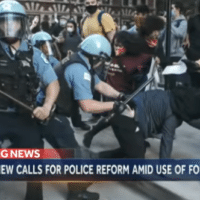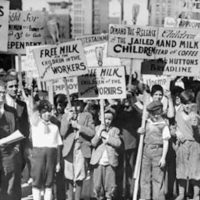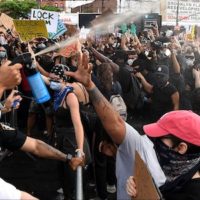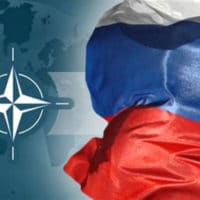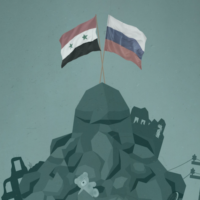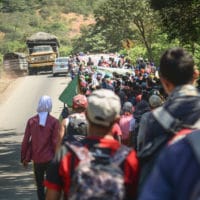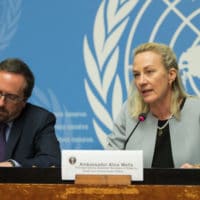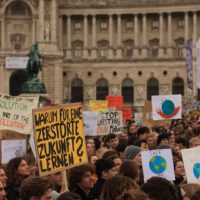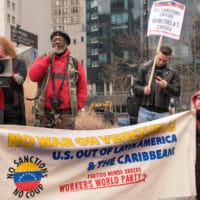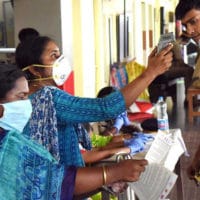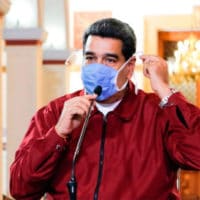-
Top 16 euphemisms U.S. headline writers used for police beating the shit out of people
“Mayor Downplays Rough Police Treatment of NYC Protesters” (AP, 6/5/20)
-
Economic collapse and unemployment councils—then and now
Hunger, homelessness, and evictions were features of the Great Depression in the United States. Jobs disappeared and working conditions deteriorated. Some “250,000 teenagers were on the road.” And how many others? By 1933 one third of farm families had lost their farms. Unemployment that year was 25 percent. The lives of working people were devastated.
-
Capitalism, Climate Change, and Pandemic: Rob Wallace, Mike Davis, and Sabrina Fernandes
Join us and Fórum Popular da Natureza on Friday, June 5, at 6 pm ET/5 pm CT, for a conversation with Monthly Review author Rob Wallace, Mike Davis, and Sabrina Fernandes about capitalism, climate catastrophe, and pandemics. The event will be in English with simultaneous translation in Portuguese. To find out more, check out the Facebook […]
-
New York police are attacking protesters-they know they won’t face consequences
The Civilian Complaint Review Board, New York’s independent office for investigating police abuses, has received 467 complaints since Friday, when the protests started, “and is committed to fully investigating them,” a board spokesperson told The Intercept.
-
NATO returns to Libya to challenge Russia
The great game in Libya has begun surging with the United States shedding its strategic ambivalence and resorting to a proactive role. At the end of May, the Pentagon marked a dramatic escalation by accusing Moscow of bolstering “Kremlin-linked mercenaries” who are allegedly helping Khalifa Haftar, the eastern warlord in Libya.
-
Under the Blacklight: The Fire This Time
Join Kimberlé Crenshaw and guests Alicia Garza, Robin D. G. Kelly, Devon Carbado, and Maria Moore for part ten of the “Under the Blacklight: The Intersectional Vulnerabilities COVID Lays Bare” series. Click here for more information. The Under the Blacklight series has interrupted mainstream discourse in order to advocate for a more egalitarian politics and a more […]
-
U.S. declares a vaccine war on the World
Donald Trump launched a new vaccine war in May, but not against the virus. It was against the world.
-
Victory: Ohio’s plan to deny workers their unemployment insurance is shelved
In early May, Ohio Republican Governor Mike DeWine began reopening the state economy. And to support business and slash state expenses, both at worker expense, he had a “COVID-19 Fraud” form put up on the Ohio Department of Job and Family Services website where employers could confidentially report employees “who quit or refuse work when it is available due to COVID-19.”
-
How Russia is botching its alliance with Syria
Russia’s relationships with its client states have never been easy. Of course, managing client states is always a complicated exercise. The Kremlin’s cupboard is full of skeletons—Hungary (1956), Czechoslovakia (1968), Cuba (1962), Afghanistan (1980), Ukraine (2014) and so on.
-
Facebook deactivates dozens of accounts of Palestinian journalists and activists
At least 52 Palestinians have been affected by Facebook’s deactivation sweep, according to data collected by Middle East Eye
-
The Politics of the coronavirus conjuncture in Ireland
The election in Ireland in early February marked a clear acceleration of the country’s ongoing left turn over recent years. Then came the virus.
-
Colombia’s government acts like a doormat for the United States—and its people aren’t going along with it
With the U.S. government now absurdly saying that Venezuela is the source of narco-trafficking, even though all evidence pointing to narco-trafficking is rooted in Colombia, the pressure on Colombia to deal with its drug problem is now lifted.
-
Could COVID-19 bring down the U.S. empire?
With the U.S. failing and China taking a leadership role in the international response to this crisis, could the COVID-19 crisis mark a turning point in the transition to a multipolar world in which China will be just as important as a world leader as the United States?
-
Don’t threaten Afghans—it will be counterproductive
The principal deputy assistant secretary at the Bureau of South and Central Asian Affairs (SCA) in the U.S. State Department, Alice Wells, dropped a bombshell on the Afghan government and the country’s political elites on April 4—and caught the international donors by surprise, too—by linking all aid to Afghanistan to the formation of an inclusive government in Kabul.
-
Austria’s ‘Unsozial’ Capitalists in a Time of Crisis
In a move seemingly reserved only for cartoonish villains, one of Austria’s best-known millionaires, Attila Doğudan, CEO of DO &CO—one of the largest culinary companies in Austria, and who employs over 11,000 people worldwide—has used the COVID-19 crisis to orchestrate a widespread layoff campaign against all restaurant employees within Austria.
-
Growing xenophobia against China in the midst of CoronaShock
Violent attacks against Asians in the United States has spiked as a consequence of the stigma driven by the Trump administration.
-
As the World tackles the COVID-19 pandemic, the U.S. raises the pressure on Venezuela
In a press conference on March 26, it was almost comical how little evidence the U.S. Department of Justice provided when it accused Venezuela’s President Nicolás Maduro and several of the leaders of his government of narco-trafficking. The U.S. offered $15 million for the arrest of Maduro and $10 million for the others. Maduro, U.S. Attorney Geoffrey Berman said dramatically, “very deliberately deployed cocaine as a weapon.” Evidence for this? Not presented at all.
-
An often overlooked region of India is a beacon to the world for taking on the coronavirus
In a pandemic, a rational person would much rather live in a society governed by the norms of socialism than of capitalism, a society where people rally together to overcome a virus; than to live in a society where fear pervades and where stigmatization becomes the antidote to collective action.
-
Cuban doctors travel to Italy to help fight Covid-19
This is the sixth Cuban team to join the fight against the pandemic in the world and the first to travel to Europe, reported Cuban Television.
-
IMF refuses aid to Venezuela in the midst of the Coronavirus crisis
On March 16, 2020, the chief of the International Monetary Fund (IMF) Kristalina Georgieva wrote a blog post on the Fund’s website; it represents the kind of generosity necessary in the midst of a global pandemic. “The IMF stands ready to mobilize its $1 trillion lending capacity to help our membership,” she wrote.

